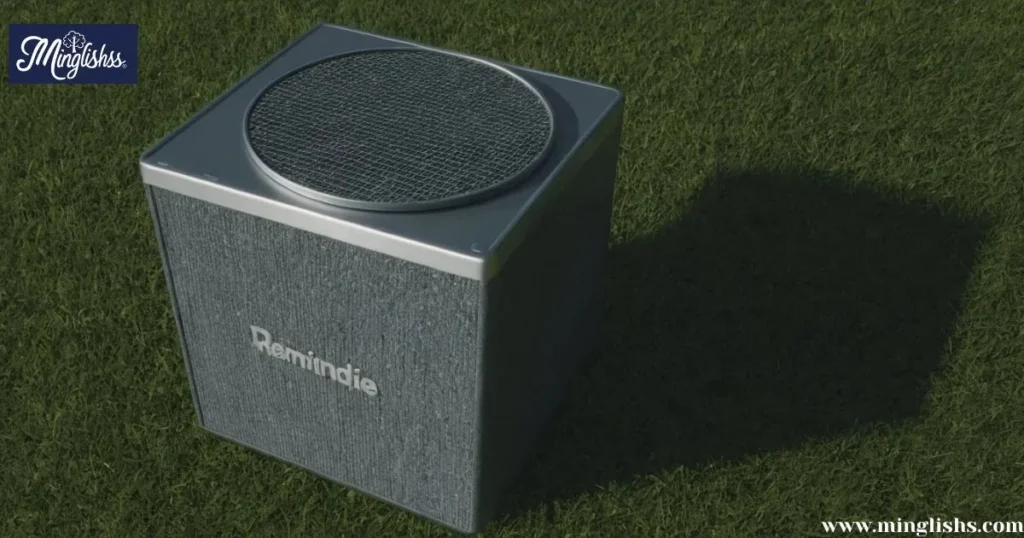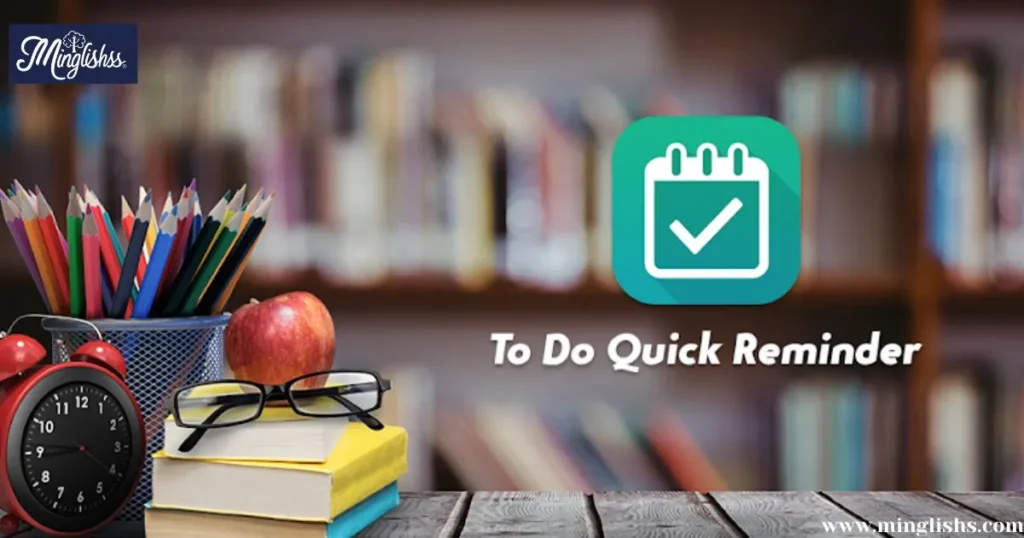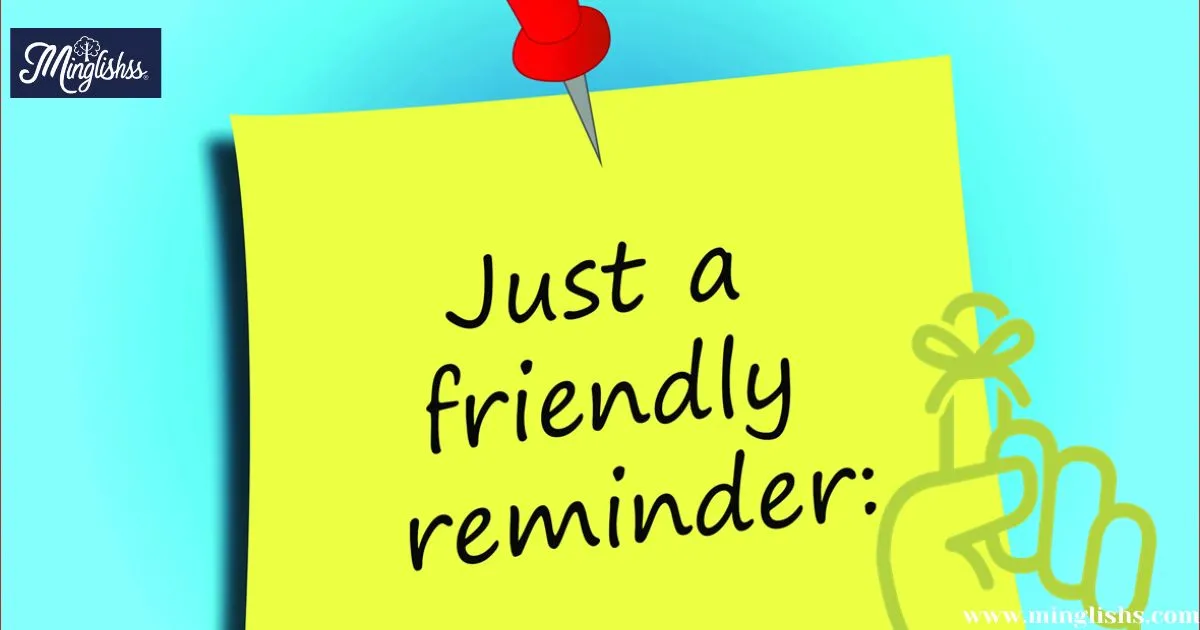“Polite and subtle ways to offer a helpful nudge.”
Reminding someone of something in a gentle and respectful way is an essential skill, especially in both personal and professional settings.
Whether you’re sending a quick email, a text, or delivering a reminder in person, it’s important to communicate your message in a way that feels polite, yet clear. In this blog, we explore a range of alternative phrases to “just a friendly reminder,” offering you new ways to nudge others without sounding too blunt or forceful.
When you need to remind someone about something, using different phrases can make your communication sound more thoughtful and considerate.
It’s a simple way to ensure that your message doesn’t come across as pushy, yet still gets the point across effectively. You’ll find that with the right choice of words, you can keep your tone professional and warm at the same time.
Let’s dive into these alternatives and see how you can enrich your language, whether you’re at work, planning a family event, or just offering a small reminder to a friend. These phrases will help you navigate delicate situations and remind others in the most respectful way possible.
1. Just a Quick Reminder
Scenario: Emily sent a quick reminder to her colleagues about the meeting scheduled for 2 PM.
Subject Explanation: This casual phrase is perfect for quick, non-intrusive reminders, whether it’s in a work email or a message to a friend.
Additional Tip: Keep the tone light and friendly, ensuring the reminder doesn’t feel like a demand.
2. Just Thought I’d Remind You
Scenario: Sarah said, “Just thought I’d remind you about the due date for the report.”
Subject Explanation: A polite and subtle way of offering a reminder, often used in informal situations.
Additional Tip: This works well when you want to be thoughtful without sounding overly formal.
3. A Gentle Reminder
Scenario: Jack sent a gentle reminder to his team about submitting their weekly reports.
Subject Explanation: This phrase is soft and formal, making it suitable for both professional and casual settings.
Additional Tip: Perfect when you need to remind someone without adding pressure, especially in work emails.
4. Just Wanted to Remind You
Scenario: Mary casually mentioned, “Just wanted to remind you to RSVP for the party.”
Subject Explanation: This is an easygoing reminder phrase that can be used with colleagues, friends, or family.
Additional Tip: Ideal for less urgent reminders, keeping the tone friendly and relaxed.
5. I’d Like to Gently Remind You

Scenario: Mark wrote an email saying, “I’d like to gently remind you to complete the survey.”
Subject Explanation: This expression conveys kindness and maintains a formal tone.
Additional Tip: Use it when addressing superiors or in professional situations that require politeness.
6. Kindly Note
Scenario: Laura wrote, “Kindly note that the deadline for submitting proposals is tomorrow.”
Subject Explanation: This formal reminder phrase is respectful, yet still direct.
Additional Tip: Best used in official communication or with individuals you may not know well.
7. Just a Heads Up
Scenario: Matt sent a quick text: “Just a heads up, the meeting has been moved to 4 PM.”
Subject Explanation: This phrase is casual and ideal for less formal or more relaxed environments.
Additional Tip: Perfect for friendly reminders, but be mindful of the context as it can seem too informal in some professional settings.
8. A Little Reminder
Scenario: Nina sent a message to her friend, “A little reminder to bring your documents for the meeting.”
Subject Explanation: This is a mild, informal alternative to “just a friendly reminder” that feels approachable.
Additional Tip: Great for reminders about small, non-urgent matters.
9. Just Wanted to Give You a Quick Reminder
Scenario: James texted his colleague, “Just wanted to give you a quick reminder about the client call this afternoon.”
Subject Explanation: This phrase balances between friendly and professional, ideal for work settings.
Additional Tip: Use when the reminder isn’t critical but still needs to be communicated clearly.
10. Friendly Reminder
Scenario: Susan sent a friendly reminder to the team about their team-building activity next week.
Subject Explanation: Simple and to the point, this is a classic phrase that doesn’t sound too formal or too casual.
Additional Tip: A versatile choice that works in both casual and professional contexts.
11. Just Wanted to Drop a Reminder

Scenario: Peter emailed, “Just wanted to drop a reminder that your feedback is due tomorrow.”
Subject Explanation: Slightly informal, this phrase is friendly and effective for day-to-day reminders.
Additional Tip: Use this in less formal, more conversational settings where you want to stay approachable.
12. A Little Nudge
Scenario: Carla sent a little nudge to her colleague, reminding him to sign the contract.
Subject Explanation: This casual, soft approach is often used among friends or close colleagues.
Additional Tip: Ideal when you don’t want to sound pushy but still need to ensure the task is completed.
13. Just a Quick Note
Scenario: David sent a quick note: “Just a quick note to let you know the meeting time has changed.”
Subject Explanation: This phrase is less formal than “just a friendly reminder” but still gets the job done.
Additional Tip: Perfect for a quick, nonchalant reminder in a professional context.
14. Just a Friendly Nudge
Scenario: Karen sent a friendly nudge to her classmate, reminding her about the upcoming test.
Subject Explanation: A light-hearted and informal reminder, great for less serious contexts.
Additional Tip: Use this when reminding friends or peers without sounding too authoritative.
15. Just to Let You Know
Scenario: Rachel messaged, “Just to let you know, the event has been rescheduled.”
Subject Explanation: This phrase is perfect for casual situations, but also appropriate for more formal contexts if you want to soften the message.
Additional Tip: It’s direct but polite, making it ideal for almost any reminder situation.
16. Just as a Reminder
Scenario: Ella sent an email, “Just as a reminder, the deadline for submissions is Friday.”
Subject Explanation: A polite and formal way of offering a nudge without sounding pushy.
Additional Tip: Use this for professional reminders, especially in work-related correspondence.
17. A Small Reminder
Scenario: Julia texted her friend, “A small reminder to pick up the tickets for tonight’s event.”
Subject Explanation: This is a friendly, gentle reminder phrase that can be used in many contexts.
Additional Tip: Perfect for quick, informal reminders among friends and family.
18. A Soft Reminder
Scenario: Richard gently reminded his colleagues, “Just a soft reminder to bring your presentations to the meeting.”
Subject Explanation: This phrase is more formal and emphasizes a non-forceful reminder.
Additional Tip: Ideal for corporate emails or when reminding someone in a respectful manner.
Other Ways to Say “Kindly Request”
19. Just a Quick Follow-Up
Scenario: Amanda sent a quick follow-up email: “Just a quick follow-up about the meeting tomorrow.”
Subject Explanation: A slightly more formal alternative to remind someone of something previously mentioned.
Additional Tip: This is perfect for professional reminders that need follow-up attention.
20. A Polite Reminder
Scenario: George wrote a polite reminder about the office hours changing for the holidays.
Subject Explanation: This formal phrase is great for reminders in a professional or customer service setting.
Additional Tip: Use this phrase in official notices or when sending emails to clients or supervisors.
21. Thought I’d Remind You
Scenario: Emily said, “Thought I’d remind you about the upcoming deadline.”
Subject Explanation: A subtle and friendly way to remind someone about something without sounding too formal.
Additional Tip: Suitable for informal communication and casual business contexts.
22. I Just Wanted to Remind You
Scenario: Tom sent an email: “I just wanted to remind you to submit your report by tomorrow.”
Subject Explanation: A simple and polite way to remind someone of an upcoming task.
Additional Tip: Works well in both work emails and casual reminders.
23. In Case You Forgot

Scenario: Linda gently reminded, “In case you forgot, our team meeting starts at 10 AM.”
Subject Explanation: Casual, yet still considerate, this phrase works when you want to give someone a friendly reminder without pressure.
Additional Tip: Best used when there’s a possibility the person might have genuinely forgotten.
24. Just a Heads Up
Scenario: Tim sent a heads up to his team about a new schedule change.
Subject Explanation: This phrase is slightly informal but still clear and respectful.
Additional Tip: Use it for reminders that are informational but not urgent.
25. Just to Keep You in the Loop
Scenario: Olivia sent an email: “Just to keep you in the loop, the meeting has been postponed.”
Subject Explanation: A more casual and informal reminder, emphasizing the sharing of important information.
Additional Tip: Use this when sharing updates, making it feel more like keeping someone informed rather than reminding them.
26. Just to Reiterate
Scenario: John sent a message, “Just to reiterate, the office will be closed on Friday.”
Subject Explanation: This phrase can be useful when you want to emphasize a reminder.
Additional Tip: Works well when you need to reinforce an important point or task.
27. Just Making Sure You Remember
Scenario: Lucy texted, “Just making sure you remember about the event tonight.”
Subject Explanation: A gentle and informal reminder that adds a level of attentiveness.
Additional Tip: Best for situations where you’re checking in on someone’s plans or tasks.
28. A Gentle Nudge
Scenario: Marcus sent a gentle nudge to his team about sending the weekly updates.
Subject Explanation: A warm, non-intrusive phrase that feels both considerate and polite.
Additional Tip: Great for reminding people of recurring tasks, especially in a team environment.
29. Just to Let You Know Again
Scenario: Sarah sent a quick reminder: “Just to let you know again, the event starts at 7 PM.”
Subject Explanation: This is a gentle reminder, appropriate for repeating an important message.
Additional Tip: Best used when the reminder is something previously communicated.
30. A Timely Reminder
Scenario: Peter sent a timely reminder about paying the subscription fee before the deadline.
Subject Explanation: This phrase is effective when you need to remind someone of an upcoming deadline or event.
Additional Tip: Use when you want to communicate urgency without sounding too pushy.
31. A Little Reminder for You
Scenario: Clara sends an email: “A little reminder for you, the payment is due by Friday.”
Subject Explanation: This phrase is casual and lighthearted, making it ideal for friendly reminders without pressure.
Additional Tip: Great for informal contexts or when you want to add a touch of warmth to your reminder.
32. Just a Little Nudge
Scenario: Greg says, “Just a little nudge to remind you about the client call tomorrow.”
Subject Explanation: This phrase is very informal and conveys a gentle reminder.
Additional Tip: Suitable for close colleagues or friends where a light touch is appreciated.
33. A Quick Reminder About

Scenario: Lisa writes, “A quick reminder about the upcoming team event this Saturday.”
Subject Explanation: This is a neutral and efficient way to remind someone about something upcoming.
Additional Tip: Best for professional settings when you want to stay concise but friendly.
34. I Just Wanted to Point Out
Scenario: Oliver emails, “I just wanted to point out that the office hours are changing next week.”
Subject Explanation: This phrase adds a slight emphasis, making the reminder stand out.
Additional Tip: Use when it’s important to ensure the person notices and acknowledges the reminder.
35. I Just Wanted to Give You a Quick Reminder
Scenario: Wendy sends a message: “I just wanted to give you a quick reminder that your feedback is due.”
Subject Explanation: A more formal alternative to “just a friendly reminder,” still maintaining a polite tone.
Additional Tip: Ideal for professional emails when you need to ensure the recipient takes action.
Pros and Cons of Using Different Reminder Phrases
Pros:
- Offers variety and freshness to communication.
- Helps maintain politeness and avoid sounding too demanding.
- Enhances professional tone when needed.
Cons:
- Can be perceived as passive in certain situations.
- Some phrases may sound too casual for formal settings.
- Might confuse the recipient if used incorrectly.
Conclusion
Offering reminders in a thoughtful, friendly way can help maintain positive relationships in both professional and personal contexts. By choosing the right phrase, you can ensure your reminders come across as polite and considerate.
Whether you’re at work or chatting with a friend, using alternative phrases to “just a friendly reminder” allows you to communicate more effectively and respectfully. Keep these alternatives in mind next time you need to send a quick reminder, and you’ll find it much easier to stay courteous and professional.

Hi, I’m Zadie Smith: I’m dedicated to helping others master English through practical tips. I enjoy making complex ideas simple and accessible for everyone.










